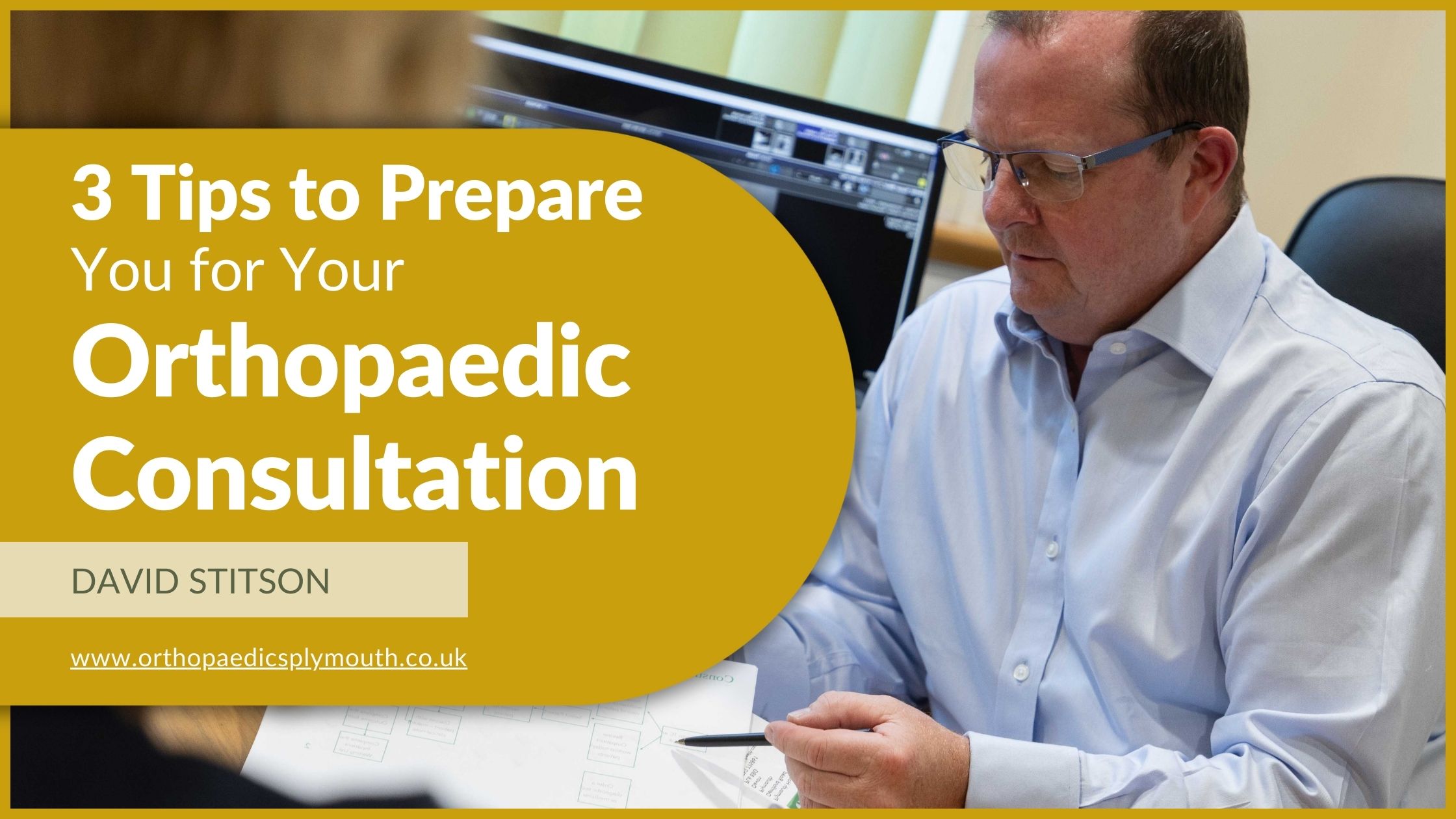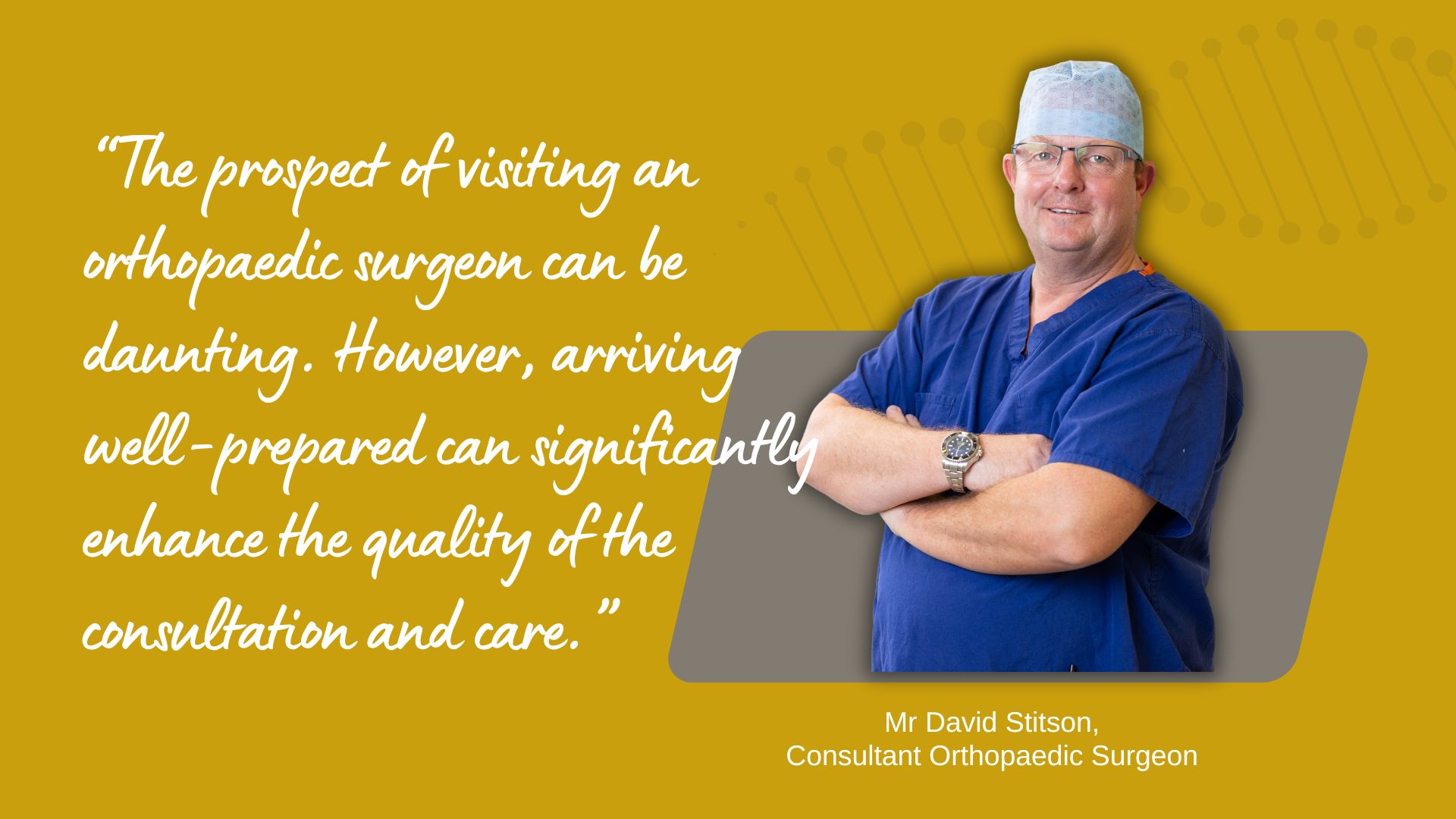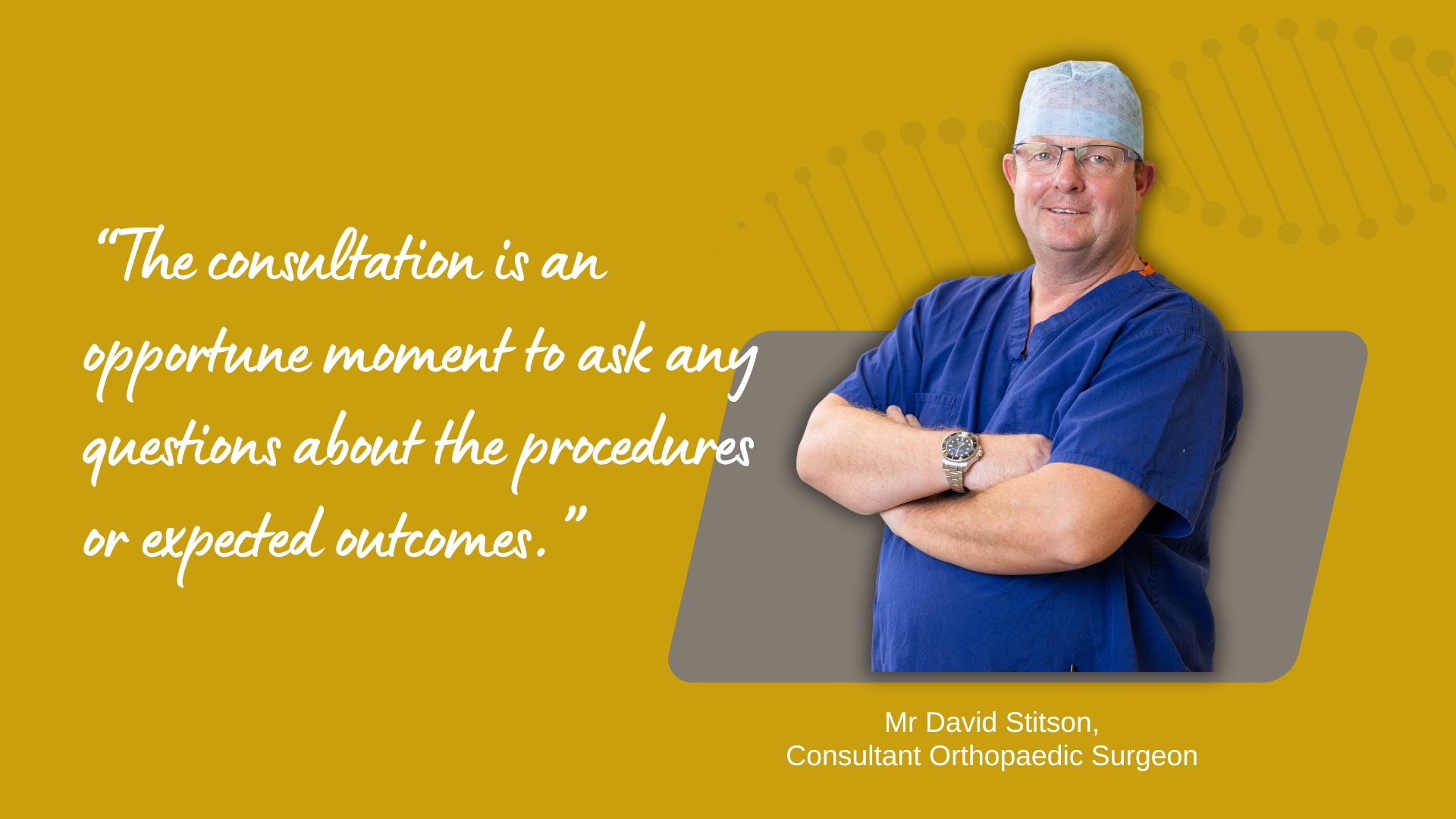An orthopaedic consultation is a crucial step for anyone experiencing musculoskeletal issues such as knee pain, hip pain or other joint discomfort.
With expert medical advice, patients can gain a comprehensive understanding of their condition and explore the best treatment options available. By consulting with Mr Stitson, a Plymouth-based Orthopaedic Surgeon, individuals can receive tailored, professional care focused on alleviating pain and improving mobility, thus enhancing overall quality of life.
Contents
ToggleHere are 3 crucial tips to help you prepare for your orthopaedic consultation with Mr Stitson.
Tip 1 – Arrive Well-Prepared
The prospect of visiting an orthopaedic surgeon can be daunting, particularly if it is your first time. However, arriving well-prepared can significantly enhance the quality of the consultation and ensure that you receive the most effective care.
Gathering Medical History and Documentation
One of the initial preparations involves compiling your medical history and relevant documentation. This serves as a foundation for the orthopaedic surgeon to understand your overall health and previous treatments. Here is what you should consider bringing:
– Medical Records: Include past operations, chronic conditions and previous orthopaedic issues.
– Medications List: Detail all current medications, including over-the-counter drugs and supplements.
– Imaging Results: Bring any recent X-rays, MRIs, or CT scans related to your condition if you have them.
– Referral Letters: If applicable, include notes from your primary care physician or other specialists – if they have not already been sent.
Having these documents organised can aid Mr Stitson in making well-informed decisions about your care, particularly if you are experiencing complex issues like knee or hip pain.
Listing Symptoms and Concerns
Before the consultation, take time to reflect on your symptoms and any concerns you might have. Creating a clear list can help you communicate effectively during the appointment. Include:
– The nature of your pain (sharp, dull, throbbing).
– Severity and duration of your symptoms.
– Any triggers or activities that exacerbate or alleviate discomfort.
– Functional limitations, such as difficulty walking or lifting.
Having a comprehensive understanding of your symptoms will enable the orthopaedic surgeon to pinpoint the issues accurately and devise an appropriate treatment plan.
Understanding the Consultation Process
Having an idea of what the consultation entails can alleviate apprehension. Generally, an orthopaedic consultation involves several stages:
- Initial discussion with the orthopaedic surgeon.
- A thorough physical examination and assessment.
- Potential diagnostic tests such as X-rays or MRIs.
Being prepared for each phase can foster a more productive interaction, ensuring that no critical detail is overlooked.
Tip 2 – Understanding What Happens During a Consultation
The consultation itself is a structured process designed to diagnose your condition accurately and discuss potential treatment paths. Here is what typically occurs during an orthopaedic consultation.
Your Initial Discussion with Mr Stitson, Orthopaedic Surgeon
At the beginning of the consultation, you will meet with Mr Stitson your orthopaedic surgeon, to discuss your medical history and current symptoms. This is a crucial opportunity to communicate openly and clearly. Expect questions such as:
– How would you describe your pain?
– When did your symptoms first appear?
– Have you tried any treatments so far, and with what results?
This stage is vital for establishing a rapport and ensuring that the surgeon fully understands your concerns. Be honest and forthcoming to facilitate an accurate diagnosis.
Physical Examination and Assessment
Following the initial discussion, the orthopaedic surgeon will conduct a physical examination. This may involve:
– Observing your range of motion: Checking how your joints move and identifying any restrictions or pain.
– Palpation: Feeling the affected area for abnormalities such as swelling or tenderness.
– Strength and reflex tests: Assessing muscle strength and nerve function.
This hands-on evaluation is essential for a comprehensive understanding of your condition and can indicate whether further tests are necessary.
Diagnostic Tests and Imaging Options
In many cases, the consultation may conclude with recommendations for diagnostic tests. These tests can provide detailed insights beyond what is visible during a physical exam. Common options include:
– X-rays: Ideal for viewing bone structure and identifying fractures or arthritis.
– MRI scans: Useful for soft tissue evaluation, such as ligaments and cartilage.
– CT scans: Offer a detailed cross-sectional image and are often used for complex cases.
The orthopaedic surgeon will discuss the need for these tests and how their results will influence your treatment plan. It’s also an opportune moment to ask any questions about the procedures or expected outcomes.
Understanding these components of an orthopaedic consultation can alleviate uncertainty and empower you to take an active role in your healthcare journey. Proper preparation and a clear understanding of the process can help ensure that your needs are thoroughly addressed, setting the stage for successful treatment and improved well-being.
It is essential to discuss all your options with Mr Stitson, who can guide you through the treatment process and advise on how you can achieve the best possible outcome.
Tip 3 – Discuss Treatment Options and Next Steps
A pivotal component of an orthopaedic consultation is the discussion around potential treatment options and subsequent steps. Once Mr Stitson has studied your medical history and completed a physical examination, he will be well-positioned to shed light on the most suitable avenues for care. This conversation is essential as it not only strengthens your understanding of the diagnosis but also empowers you to make informed decisions regarding your health.
Understanding Your Diagnosis
Before delving into treatment specifics, your orthopaedic consultant will take the time to explain your diagnosis comprehensively. This involves clarifying the nature of the condition, whether it relates to a bone, joint, muscle, or nerve issue.
For instance, common conditions like knee pain and hip pain are meticulously explained, including any underlying causes identified through diagnostic imaging or testing. Mr Stitson will explain clearly how the condition may progress if left untreated. This knowledge equips you with a clearer picture of your health, allowing you to weigh your options effectively.
Exploring Conservative Treatment Methods
Initially, many orthopaedic issues can be managed with conservative treatment methods. These options are typically non-invasive and pose minimal risk. Your consultant may recommend:
– Physiotherapy: Structured exercise programs designed to improve strength, flexibility, and function.
– Medications: Over-the-counter or prescription medications to manage pain and reduce inflammation.
– Injections: Corticosteroid or hyaluronic acid injections to alleviate swelling and discomfort.
– Lifestyle Modifications: Advice on changes, such as diet adjustments, activity limitations or use of walking aids to assist in managing symptoms.
The objective of these treatments is to relieve symptoms while improving your overall quality of life without the need for surgical intervention.
Considering Surgical Options
In cases where conservative treatments prove ineffective, or the condition is substantially advanced, surgical options may be necessary. Mr Stitson will discuss the feasibility and benefits of surgical intervention, covering the specifics of the procedure, expected recovery time, and potential risks involved. Common orthopaedic operations include arthroscopy, joint replacement and reconstructive surgery.
The decision to proceed with surgery is significant and typically involves thorough dialogue with your surgeon, ensuring you comprehend how the procedure aligns with your long-term health goals. Rest assured, your orthopaedic team will support you, providing you with all necessary information to confidently navigate the path forward.
Making the Most of Your Orthopaedic Consultation
To maximise the benefits of your orthopaedic consultation, consider taking an active role in your healthcare. Here are some tips to ensure you make the most of the appointment:
1. Come Prepared: Bring any previous medical records, test result, or imaging that might relate to your condition (if you have them).
2. Ask Questions: Do not hesitate to ask the orthopaedic surgeon about the diagnosis, potential treatments, and any associated risks or outcomes.
3. Discuss Lifestyle Changes: Enquire about any alterations you might need to make to assist your recovery, such as dietary changes or exercise routines.
4. Follow-Up Instructions: Make sure you fully understand any aftercare or follow-up appointments that may be required.
Engaging proactively with your healthcare professional during your orthopaedic consultation can help ensure you receive comprehensive care tailored to your individual needs.

About Mr Stitson
David Stitson is a Plymouth-based Consultant Trauma and Orthopaedic Surgeon. Trained both in the UK and internationally, he has worked in medicine for more than 20 years for the NHS, for the Royal Air Force and in private practice. Mr Stitson operates privately at the Nuffield Health Hospital, Plymouth.

The Nuffield Plymouth CQC Rating
The Nuffield Hospital has a history that spans over half a century and has built a reputation for high standards of care, professionalism and expertise in delivering health services. They aim for continuous quality improvement in everything they do.
Active Quality and Governance programmes are in place at the Nuffield Hospital Plymouth. As part of this, the hospital is inspected by independent healthcare regulators to ensure it meets the fundamental standards of quality and safety as determined by the regulating body (CQC).
In the most recent inspection, Plymouth Nuffield Hospital was rated as ‘Good’ overall, however, the surgical element of the inspection was rated as ‘Outstanding’. The hospital was referred to as:
“Outstanding in effective and caring, and
Good in safe, responsive and well-led.”






